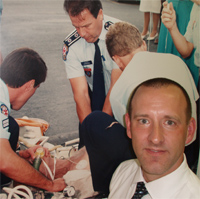 It’s no surprise to paramedic lecturers at Charles Sturt University (CSU) that paramedics have again been ranked first in the annual 2011 Readers Digest survey of public perceptions of the trustworthiness of a range of professions.
It’s no surprise to paramedic lecturers at Charles Sturt University (CSU) that paramedics have again been ranked first in the annual 2011 Readers Digest survey of public perceptions of the trustworthiness of a range of professions.Mr Joe Acker, lecturer at the School of Biomedical Sciences in Bathurst, said that while he was unaware of the details of the methodology of the Readers Digest survey and the size of the respondent sample, the survey tends to substantiate his perceptions of people’s responses to the individual paramedics they encounter and the service they provide.
“Paramedics, or ambulance officers as they have been known in the past, win people’s respect and trust simply through their uniformly high standard of professionalism in many confronting and discomforting emergency situations,” Mr Acker said.
“Quite simply, people trust paramedics because they are a source of calm help and stabilising care at times when we are most distressed and vulnerable. Paramedics are perceived as ultra-reliable, as they nearly always respond to calls for assistance, and they embody core values that people admire.”
Mr Acker reflected that the notion of ‘trust’ was generally accepted without examination, but in the context of the ‘most trusted profession’ survey, it was important to consider the hallmarks of trust.
“We try to instil in our paramedic students at Charles Sturt University the necessity to demonstrate reliability (dependable performance), sincerity (underpinned by transparency), competence (acknowledged capabilities), interdependence (interactions with others), and integrity (adherence to key principles).
“My colleagues and I stress to students that patients’ and the public’s trust must be earned, is precious, always at risk, and easy to lose - as we saw with many major financial institutions during the global financial crisis. Trust lies at the core of governance, has internal and external dimensions, and must be underpinned by competence.
“If people similarly attribute these qualities to paramedics, then the profession must continue to strive to maintain public trust,” Mr Acker said.
Anyone interested in studying to be a paramedic can find out more about the Bachelor of Clinic Practice (Paramedic) and the double degree Bachelor of Nursing/Bachelor of Clinic Practice (Paramedic).
The CSU paramedic program also now offers two new postgraduate courses; the Graduate Certificate in Emergency Medical Services (EMS) Leadership and Management, and the Graduate Diploma of Clinical Practice (Paramedic).
More information about courses at the CSU School of Biomedical Sciences can be found here.





Social
Explore the world of social